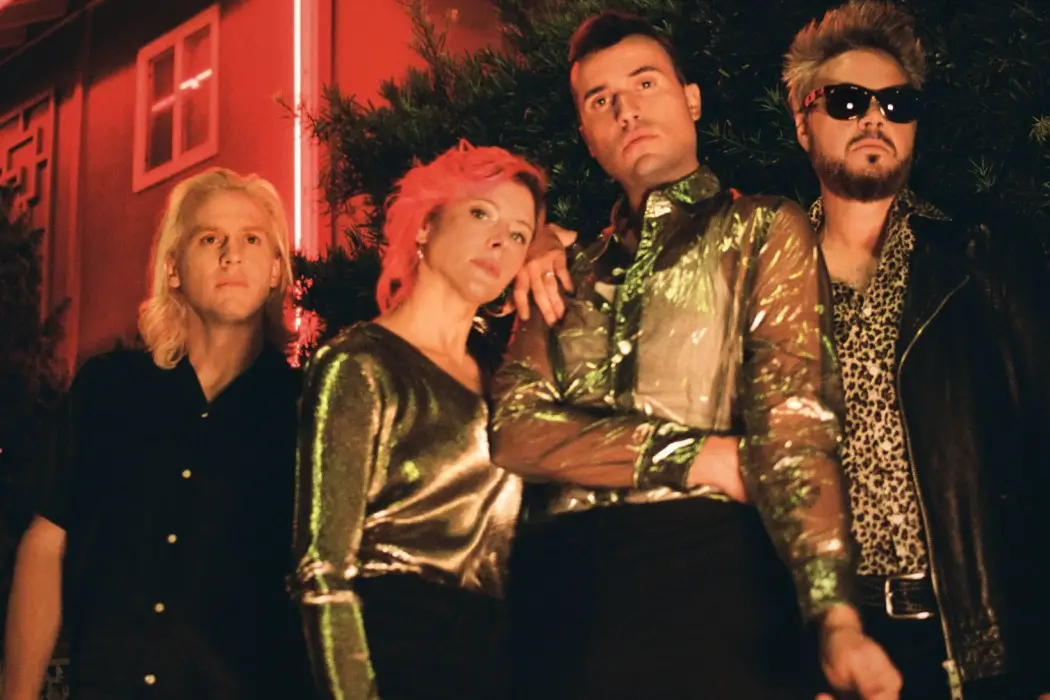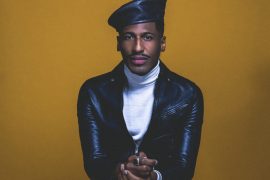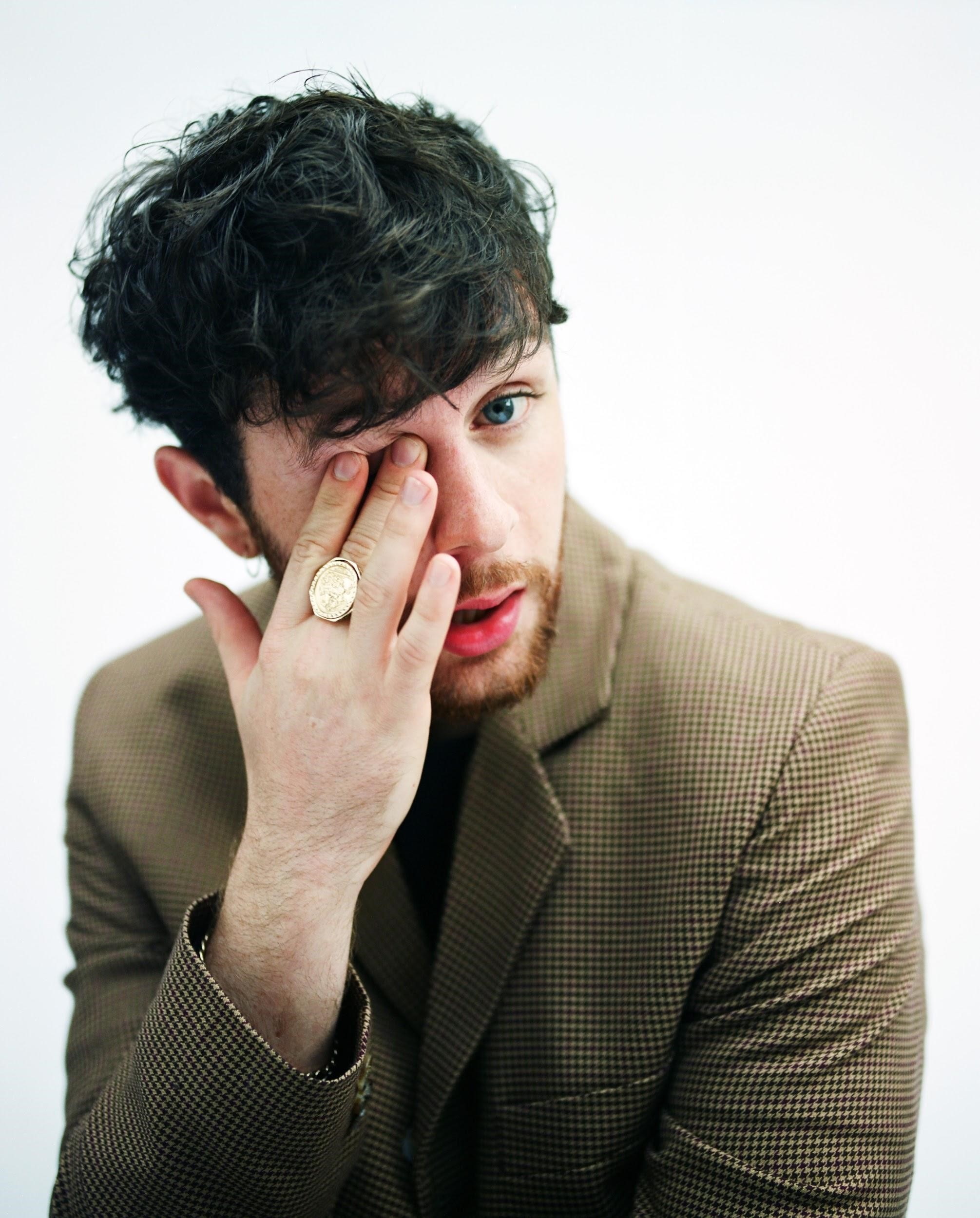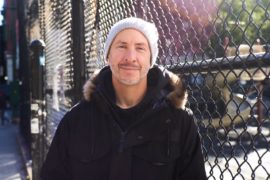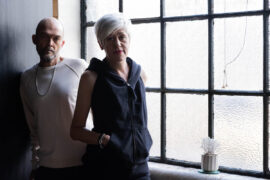Neon Trees’ Tyler Glenn talks to Atwood Magazine about genres and labels, coming out, My Chemical Romance, and the band’s electrifying first single in over five years, “Used to Like.”
Stream: “Used to Like” – Neon Trees
I think at our core, we can’t help but be at that “ten” all the time on most of our songs.
When one thinks of Neon Trees, electrifying rock sounds and energetic pop music come to mind. Over the past decade, the band led by Tyler Glenn has treated the world to such hits as “Animals” and “Everybody Talks” – massive, bombastic bangers full of verve, vivacity, and a youthful passion. Inspired by the likes of The Strokes and The Killers, Neon Trees came into their own with a finely-honed balance of chaos and control, raw rock and polished pop.
Now more than ten years into their career, Neon Trees continue to maintain their sprightly lust for life, even as they grow up and face their mid-30s. The band’s anthemic new song “Used to Like” is a hearty explosion of angst channeled through the dynamic pop/rock fans have come to know and love about Neon Trees’ repertoire.
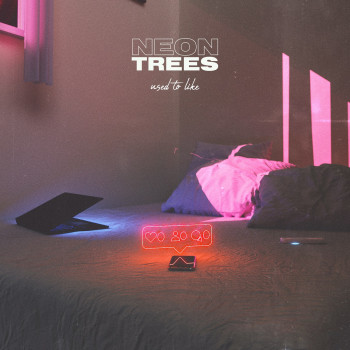
If only you were lonely
maybe I was holy
we could be together
bending over backwards
you become an actor
be my thrill forever
you once told me I was all you had
I guess I know life and
it doesn’t work like that
oh honey
Released November 13 via ADA / Warner Music, “Used to Like” is the lead single off Neon Tree’s upcoming fourth album, due out in 2020. It’s also the the band’s first single in over five years, following the release of 2014’s Pop Psychology – and while much has changed over that time, the quartet of Glenn [lead vocals, piano, keys], Chris Allen [lead guitar], Elaine Bradley [drums] and Branden Campbell [bass] have remained steadfast in their mission and their connection.
“When you strip it down, it still boils down to the four of us loving what we do together when we come together,” Glenn tells Atwood Magazine. “Through all the career highs and lows… we still have the same amount of passion and desire, [and] we still play just as passionately when we get on stage.”
In 2014, Neon Trees’ music was marketed around Glenn’s recent and highly publicized coming out – although it had been written beforehand. This time around, Glenn says the new music is as true to himself as possible. “There’s a bit of a “no ceiling” feeling on these new songs,” he remarks. “That’s not to say that it’s just all explicit or not in kind with what a Neon Trees record would have, but I think it’s very pure and unfiltered.”
“Used to Like” echoes this untethered authenticity: Refreshingly energetic, the song ripples with melodic buoyancy while its lyrics sink into a sort of romantic despair.
“As much as it is upbeat and anthemic, if you broke it down and just read the lyrics, it’s kind of sad and desperate in away,” Glenn notes “It’s kind of a bit like, “Come on, let’s do this. Let’s just make this work.” I think that’s a really important mood to capture, because we all feel that – whether we like to talk about that or not – I think there’s moments we have that, where it’s not a good look to look desperate, but as human beings, that can be a natural inclination sometimes. So in that way, I’m glad that there’s a song that exists like that.”
We hear that desperation play out in a rollicking chorus:
now you’re sayin’ I’m acting crazy
and I don’t see what you see
get back to what you used to like about me
back to what you used to like about me
highs so high, drinks for free
lets go to extremes
get back to what you used to like about me
back to what you used to like about me
As much as Glenn sings about wanting to go back to the high times in a relationship — the moments when “you’re not able to see the flaws or the problems, because the joy of being together overshadows it” — ultimately, “Used to Like” recognizes that those blissful days are over. It is as much a lament for the past, as it is a requiem on this bygone relationship as a whole.
if only you were lonely
maybe you would show me
we could be together
playing make believe lies
you could never play nice
be my thrill forever
I once told you you were all I had
I guess I know life and
it doesn’t work like that
take it back
take it back
take it back now
used to being lonely
never good at being holy
From Tyler Glenn’s perspective, this record marks the very beginning of his growth. “I’m definitely an adult and I’m matured in a lot of ways, but I think there’s just this zest for life that I have – maybe even more so, now,” he reflects.
”Used to Like” is a welcome return from one of America’s coolest pop bands: Confident, honest, and bursting at the seams. After five years, we couldn’t ask for anything better.
Neon Trees’ Tyler Glenn recently spoke to Atwood Magazine about genres and labels, the impact of his coming out, My Chemical Romance, and the band’s electrifying first single in over five years, “Used to Like.” Dive into the music and more in our exclusive interview below
I like that we’re a band people specifically listen to, to make themselves feel good!
A CONVERSATION WITH NEON TREES
Atwood Magazine: So, my knowledge of Neon Trees pre-dates Habits, to the independently-released Becoming Different People and Start a Fire. I just want to say how exciting it is for me that you are continuing to thrive all these years later.
Tyler Glenn: No way! Becoming Different People is pretty cringey; Start a Fire I can back, but (laughs) that’s awesome that you know all that! That’s a cool way to look at it – thank you, that’s very cool!
You’ve been around for quite some time; to what do you owe Neon Trees’ continuity?
Tyler Glenn: We didn’t meet as young friends; we all played in different bands when we first met, and I think we all knew that we had talent. Above all, we knew that we really wanted to devote our lives to making something of a band. That was always the goal – to tour. Things albums and charts and singles and things like that weren’t really on the radar. When you strip it down, it still boils down to the four of us loving what we do together when we come together. Through all the career highs and lows, the industry stuff – figuring all that out – when you strip it away, and we still have the same amount of passion and desire. We still play just as passionately when we get on stage. So I think that’s probably what I owe it to — just an understanding, at the core of it, between the four of us.
You always wanted to be doing this, and you made it a reality.
Tyler Glenn: Yeah. I think we also know that no one can really take it away from us. If we want to end it, we’ll end it, but I don’t think any of us has ever wanted to. So if anything, it’s just been navigating the industry changes and things like that – having people in your corner that are pushing you. We’ve never really stopped writing or thinking about the next thing.
2019’s restart is being hailed as a new beginning for Neon Trees; why is that?
Tyler Glenn: Well, I think there’s a few key factors. I can speak on the fact that I’m a totally different person in regards to my perspective on life and the world. I’ve been through a lot personally and a lot of growth; I’m kind of in the beginning of my growth, and it’s really exciting to be 35 and be 10 years into recording career, and just feel like you’re at the beginning of something – and that’s how I feel! That’s, to me, what’s going into this new album.
And when I say this marks a new beginning or a line in the sand, it’s not in a way to at all shame or disregard our past work, because it’s so important and I really love everything we’ve done, but I also look at each album as a snapshot of where I was in my life. This new body of work just feels like it really speaks to who I am right now, and I think I’ve never felt more supported by my bandmates in the lyrical decisions, scenes, and tone of the record. I feel like we’re all on the same page, and some of the pettiness or ego stuff that just being in a band naturally can bring, that’s really been not present in the last year and a half. So in that way, I think it marks a new beginning just because I don’t think we’ve really had this long to make a record since our first record. I think we for better or worse had some time to really think about what we wanted to do next!
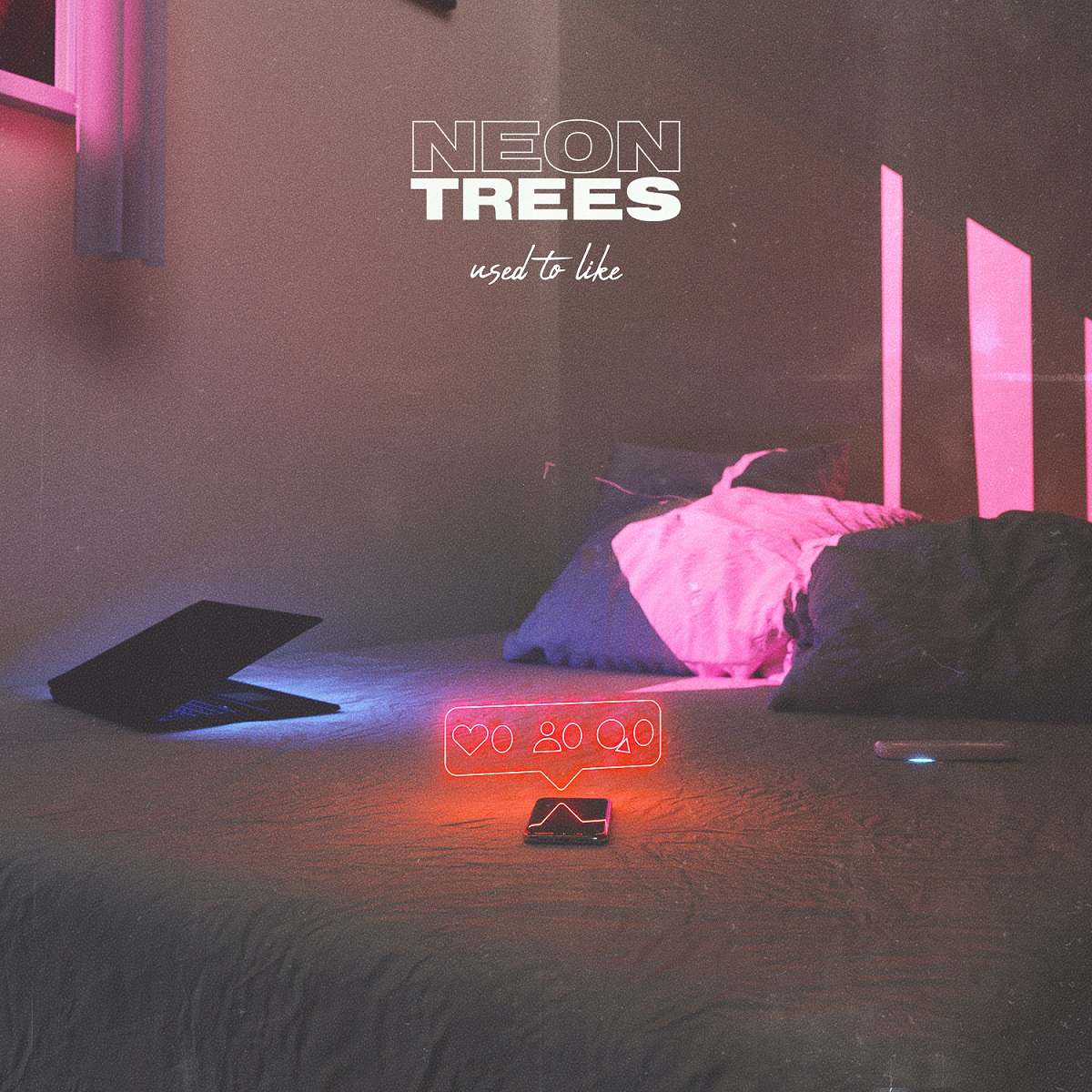
Let’s go back to 1983 – I mean, let’s go back to 2010, and your debut album. What is it about that energizing pop/rock sound that you found so attractive?
Tyler Glenn: I think it’s really like due to what I grew up on. I always mention influences like Morrisey The Smiths, and the Strokes, New York Dolls, Michael Jackson, and things like that as influences; but really, a lot of the music I grew up on was alternative radio bands. The late ‘90s was my high school era… and then a lot of really wonderful new wave and ‘80s and late ‘70s gems that really got me as a music fan. I think that, combined with being a fan of pop punk and indie and emo of the early 2000s was really important to me.
But I think I was always attracted to something that was melodic; even if it wasn’t straight-ahead pop, it always melody and a bit of singability to it, and I think that was really straight ahead in our first record. It was also our first chance to really distill what we loved and what we were fans of. Being in a studio for the first time, for a long period of time with Habits was a big part of why we were able to really, fully shape our sound.
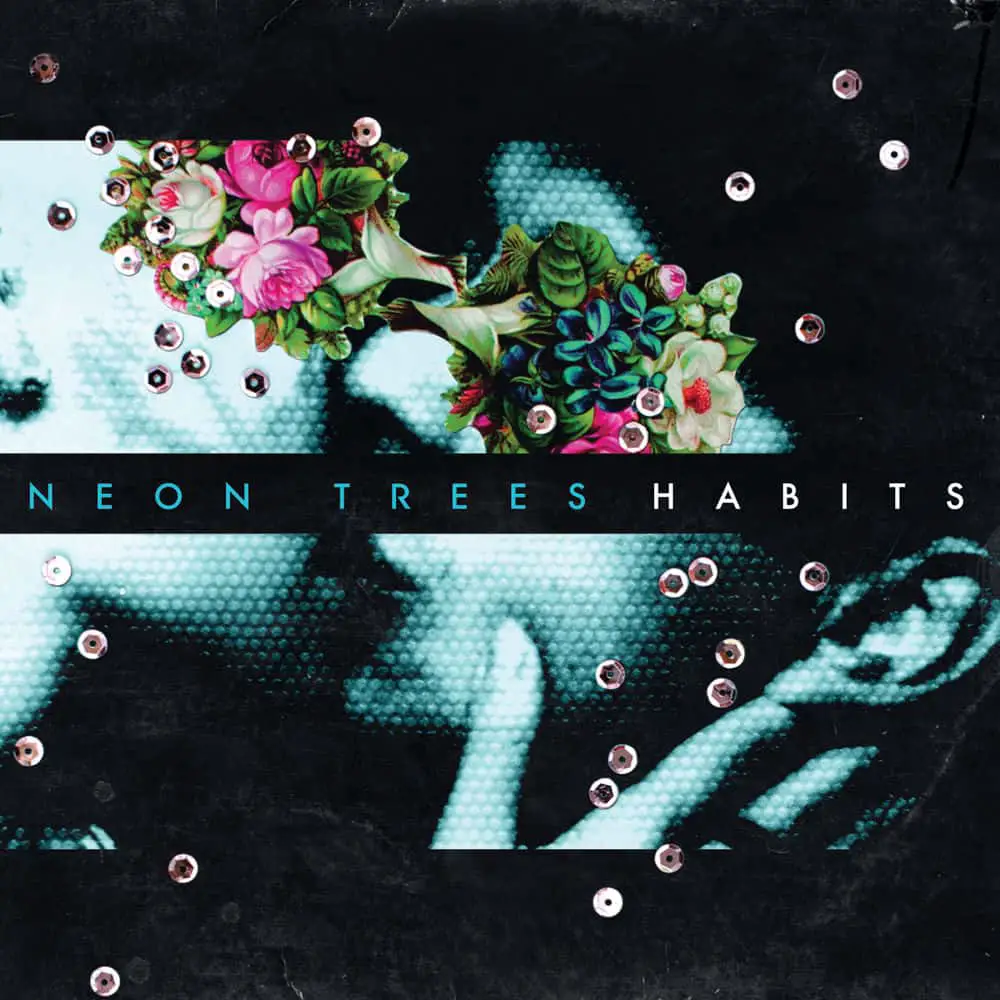
There’s this undercurrent of youthful angst in your music – it’s that drive to want to get up and shout.
Tyler Glenn: Yeah, definitely. I think a lot of it has to do with my arrested development in a way. I’m 35, and this new album, I would say it’s still very much that youthful exuberance that just kind of comes out when I write songs, especially in Neon Trees. I don’t know; I’m definitely an adult and I’m matured in a lot of ways, but I think there’s just this zest for life that I have – maybe even more so, now.
Your biggest hits by a long shot have been “Everybody Talks” and “Animal.” Do you feel these songs accurately represent Neon Trees?
Tyler Glenn: Yeah! Maybe not fully. You know, I’ve wrestled with that throughout the last 10 years or so, because I think you start a band, and before anyone knows you, you kind of have this idea of the types of people that will show up to your show, and the types of people you want to show up to your show. I always went to shows, and that’s where I met a lot of friends as a teenage, and we would dress certain ways and things like that… Then you put your music out, and you kind of find your audience. So for me, I look back now and, yeah, “Animal” and “Everybody Talks” totally sound like “Neon Trees,” even though in my mind, Neon Trees also sounds like “Girls and Boys in School” or “Sleeping with a Friend.” There are some elements that I think our fans know, and that maybe comes out more at our shows, but I definitely feel like those songs are representative or at least a doorway in. It’s not misleading in any way.
What additional would you suggest for someone trying to really understand who Neon Trees are?
Tyler Glenn: Not to plug a playlist I just made, but I did make a playlist yesterday of 22 Neon Trees tracks that I think are vital. We put it on our Spotify. There are songs on Pop Psychology that I think didn’t really get their due, like “Love In the 21st Century” and “Teenager in Love,” but I think at our core, we can’t help but be at that ten all the time on most of our songs.
Something I’m excited about this new record is that there’s a couple of tracks that do live in a space, that are not fully at 10. I also learned to embrace that I like that we’re a band people specifically listen to, to make themselves feel good! I don’t think it’s fluff, and you know, I can say that because I’m in the band, but I think our fans have been really supportive, and in that way it’s cool.
I like that we’re a band people specifically listen to, to make themselves feel good!
Tyler, are you trying to tell me that you wrote a ballad?
Tyler Glenn: We did right a ballad! There’s actually a very true, down-the-line ballad. It’s kind of a heartbreaker. It’s good; it’s really good!
How do you feel you’ve evolved as a songwriter over the past decade?
Tyler Glenn: I can personally say exponentially, just because I think I’ve only allowed myself to be less and less filtered on every record. I also consider Habits to be as pure as I could have been writing a record at 24-25, given the life that I had been brought up in and my sphere of the world – but I think I’ve been able to see a lot of the world, experience a lot of my own life, and be a lot more honest in my life. I think that only just shows up in music hopefully, and the music you’re adding. With my solo record, getting to really not be writing for anyone else but myself on that, that was a big turning point for me. Like I said at the beginning, I don’t feel this is the end or in the middle; I still feel very much in the beginning of my growth.
Can you talk to me briefly about your solo album, Excommunication?
Tyler Glenn: I always was going to write a solo record that year; my band was well aware of it, my label was supportive of it. I was writing a lot of songs that didn’t necessarily sit in the Neon Trees universe or world, or whatever you want to call it. I ended up having a bit of a personal crisis with faith and my identity and sexuality, and I had come out a few years ago.
I remember that.
Tyler Glenn: I was brought up, Mormon and I had to face the fact that there wasn’t a lot of space for being gay in LDS, and there was a lot of collision during that year with a lot of rhetoric that was being put out by the church. It was a bit of a faith crisis, and I just turned to music and I wrote a record about being shameless and about embracing my identity. It really found a cool niche audience; I wrote it as a as a big pop record, but to me, looking back at that period, it was really cool to see that it’s found an audience that it’s really speaking to. It’s been really rewarding in that way.
It was also something I had to put on the shelf, because I think staying in that space was beginning to be a bit unhealthy. It really lifted me to look to the future: I ended up doing a Broadway show last summer in New York for thirteen weeks – Kinky Boots on Broadway! It was so great and rewarding, and I came back from that experience and went right into writing this new Neon Trees record, and it really has all felt like a very natural turn! I got really renewed for Neon Trees again.
I cannot believe it’s been five years since Pop Psychology. How have those songs sat with you over time; do you have a new relationship with them as you’ve grown?
Tyler Glenn: It’s interesting because the marketing around that record and a bit of that tour was very much focused on me coming out. I still wasn’t out when I wrote it, but I was writing from the purest place I could at that time. I look back at those songs now without the relationship to the personal and the story; I listen to that record occasionally… We’ve even added a couple of those songs back into our live set. And it’s like I love “I Love You (But I Hate Your Friends)” and “Teenager in Love”… There’s a couple of real gems that I forgot about because we would only play a few songs on that record the last few years. It’s really cool; at the same time, I think looking at it, I’ve definitely been on fast-forward with growth. There’s parts of that record I would even go back and remix, but that’s just part of being an artist and listening to your work. You can’t tweak shit forever; you kind of have to put it out!
This next Neon Trees record is your first one as being out. How do you feel that impacts your music; do you feel like there's a relationship between those two things?
Tyler Glenn: I’ll say this – and I’m just excited about this album; this isn’t me trying to hype it up so that people listen to our new record!
I mean, you can do that too!
Tyler Glenn: I think authentically, not only is it the first body of work with Neon Trees that I’ve written as out and living my life, but also, I don’t really have this feeling that a lot of the faith I had subscribed to, was put on my music as well. I don’t know if that resonates with everybody, but for me, there was always a limitation on the themes I was able to comfortably write about publicly. I think there’s a bit of a “no ceiling” feeling on these new songs. That’s not to say that it’s just all explicit or not in kind with what a Neon Trees record would have, but I think it’s very pure and unfiltered.
I think it’s also the first record where I’ve had the blessing and support of my bandmates, where there’s not been a conversation of like, “Hey, do you have to say fuck there?” or, “Hey, do you have to talk about that?” I’m way more confident in my writing. I was able to write 40 this last year, and there’s only 10 on the record, but I was given the space to be able to write a lot and really hone in on what record we were going to make, and what were really trying to say on it. In that way, it’s really cool.
There was a period of time where we had left our original label and we had a little bit of limbo time before we found a new home, and it was really nice to create without hovering –not to disrespect labels, but it didn’t feel like there was something hovering over wanting to hear; it was a lot of being able to do a lot of trial and error and write a ton.
It seems like the past four years out of the spotlight have proved healthy for you and the band. This brings us to “Used to Like,” which carries with it that same electrifying energy as we heard nearly a decade ago. Where did this song come from, and why are you returning with it?
Tyler Glenn: I wrote it literally a year ago this month. I was kind of doing back to back sessions with a producer, Mike Green, whom I’ve been writing with since about 17 on and off. I knew I was going in that morning and I was having a frustrating text conversation with someone I was in a bit of a relationship with. It was the last of the million up and downs that I could tell, this is leading nowhere. I remember we were talking about something, and he was very antagonistic, and I said, “Well, that’s what you used to like about me.” I texted him that and I was like, that’s a really interesting idea for a song.
That’s the beauty of music, is that you can just put your real life into it. And it just came pouring out! I remember the song wasn’t even finished, I took the demo and I remember just listening to it a million times. That’s usually been a marker for a song that I know – whether it’s like gonna do well or not, or connect – it’s always like, those types of songs… I did that with “Animal” when we first wrote “Animal,” I remember listening to the demo a million times. That’s always a sign, like, “Hey, I think there’s something special about this.” Whether it’s my favorite song on the record or not, it’s always felt, since it was around, that it was the way to start this next era or chapter. It’s felt good to look back over a year and always know this was the song. Now I listen to it and I stand by it so much, and I’m just psyched for people to hear it! All the energy feels good. At the end of the day, people decide if they like music or not, and I have to just go with my gut, and what my connection to the song is, and hope that people can feel that, too.
“Let’s go to extremes, get back to what you used to like about me,” you sing in the chorus. What do you think about when you hear these lyrics?
Tyler Glenn: It’s nice because throughout writing this record, there’s a lot of songs connected to that relationship. But I also ended that relationship right before the turn of this last year, so it was right before January. It’s been cool to be distant from that personally, and also grow a new appreciation for the songs. When I listen to those lyrics now, I do think of that relationship, but I think about the growth I’ve had since – and I think about how important it was to capture that desperation in a way, because that song, as much as it is upbeat and anthemic, if you broke it down and just read the lyrics, it’s kind of sad and desperate in away. It’s kind of a bit like, “Come on, let’s do this. Let’s just make this work.” I think that’s a really important mood to capture, because we all feel that – whether we like to talk about that or not – I think there’s moments we have that, where it’s not a good look to look desperate, but as human beings, that can be a natural inclination sometimes. So in that way, I’m glad that there’s a song that exists like that. I think in true Neon Trees fashion, we’ve always had songs where maybe the music is really upbeat, but the lyrics are kind of sad. It stays that way with this song, too.
I think back to Habits and how you open with “Sins of My Youth” and you close with “Our War” and throughout, it just it feels like a crystalline debut album. You open it slow, and then you ramp up, and then you kind of explode at the very end. You're talking about relationships the whole time; you're talking about your inner self and everyone around you, and your relationship with yourself. There's this theme throughout that record, and Neon Trees’ songs have often had similar undercurrents that connect all the music together. Do you feel there's anything that connects this new album and all of its song?
Tyler Glenn: That’s something that was really important to me. We did put a couple of songs out over the last few years that are just standalone singles, and I love the songs, but they were never really connected to anything else. As a music fan and listener, regardless if the album as a product or body of work is relevant or not, I think our band has just always wanted to make albums, regardless of whether that’s the “way” to do it in 2019 or 2020.
Writing this record, there was definitely a through-line through the record. Especially when we’ve honed it down to these 10 songs, I think it’s really succinct; there’s an arc through the record. I think I’m still writing about themes that are pretty much on par with Habits or Picture Show, but I’m doing it with this new lens with this new, current lens and with a lot of the growth that I’ve had over the last five years or so. There’s definitely an arc, and I think that’s cool to listen, for people that care to listen to a record in its entirety, I think that’s still important for me.
Do you consider yourselves a pop band or rock bands? Do you look at those labels and think about the state of music that you make in this decade and these days?
Tyler Glenn: 2009, 2010, when we called ourselves a pop band, that was during an era where we were just coming out of a lot of heavy rock and indie, guy-centric. In 2010, it felt kind of cool to say, “Yeah, we know that a lot of pop music is scene as inferior, but we’re a band that also embraces pop and we’re not uncomfortable with that.”
At the same time, we’ve always played like a rock band. I think regardless of labels or what radio station we’re being played on or whatever, I think we’ve always played like a rock band and I think we’ve always been, for lack of a better word, “comfortable” in a band setting, as opposed to a shiny pop setting.
I still am the same type of fan that I was as a teenager; I kind of love that the playlist culture is the way now, because I was such a mixtape type of kid that loved hip-hop and pop as much as hardcore and indie rock and bedroom pop, and all that stuff. I don’t necessarily think about it in that way; I think I write pop songs at the end of the day, but I think we dress them up like we would.
I think my reference to pop when I say, “We write pop songs,” is probably artists that now are looked at as “classic,” like a Hall & Oats or Phil Collins: Gorgeous writing, you know? I guess I’m just writing how I would write; it bothers me less what people kind of position it as you know? Whereas maybe it meant more when I was a bit younger.
We’re at the end of a decade where we’ve seen the dissolution of genre, too.
Tyler Glenn: Totally! I think that’s what’s kind of exciting too. We haven’t put a record out in the bona fide streaming era. It was kind of the Wild West when we put out our last record. That’s exciting to me because the music listener these days doesn’t really care. They just want to listen to music they like, and I don’t think it matters what style or type.
As we finish up, I'm curious to hear your take: Have you heard about like My Chemical Romance reuniting?
Tyler Glenn: Of course! I’m amped. t’s a personal thing because we did their last North American tour. We were support for the Danger Days tour. I was a giant MCR fan especially. I love Black Parade, but I really love Danger Days because they were playing with color, and they hadn’t really up until then. They were playing with sounds that were out of that straight ahead emo/screamo/punk thing. Here I am putting labels on them and, you know, to me they’re just MCR – but I think it’s rad! Gerard’s an amazing talent, and I think that band’s just really hit a nerve, and I think it’s evident because their return this is so exciting.
Who else are you listening to at the moment? Who do you recommend to our listeners?
Tyler Glenn: Honestly I’m listening to a lot of Neon Trees final mixes! That’s what happens when you’re writing and mixing a record, but let me just check my last playlist… I make playlists every week to kind of keep myself in it. I love the new MUNA record. I really love what they’re doing, because again, they sound like they make pop songs, but kind of a cool edge to it and they’re just really good tunes, I really like it. I’m excited for the new Harry Styles stuff; I think it’s exciting what he’s been able to do with his mainstream pop career, and turn into something interesting… I always listen to Twin Shadow and The Japanese House for vibes, and Jose Gonzalez and Bon Iver – but that’s probably the type of music I turn to when I’m trying to not listen to anything that would resemble my band or anything pop; I try to go with quiet stuff.
Tyler, this has been so much fun. Congratulations on the new music; I am so excited for it to be out!
— —
:: stream/purchase “Used to Like” here ::
— — — —
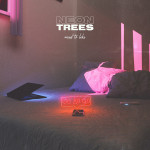
Connect to Neon Trees on
Facebook, Twitter, Instagram
Discover new music on Atwood Magazine
? © Grace Pickering
:: Stream Neon Trees ::

